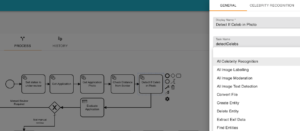
18 Mar Is an AI Robot going to steal your job?
As an Enterprise Software Professional, and somebody who “reads the trades” and likes to think they keep a good eye on the trends in the marketplace, there’s one question I get that makes me exasperated and concerned at the same time:
“When are the robots going to take my job?”
The rise of Machine Learning and Artificial Intelligence (AI), in general, is all around us, and we’re seeing levels of buzzword hype not seen since “Big Data” and “The Cloud”. If you don’t have AI somewhere in your pitch deck, your start-up is surely missing out on the funding party…
But is this just another unrealistic hype-driven craze destined solely to plague the PowerPoints of the world? Are these fears of becoming redundant to a machine valid?
Well, as with most of these predictions, the answer is “sort of…”
Here’s the first machine learning tool I came into contact with when I was about eight – the coin counting money box.

To an eight-year-old, this is magical. The money box knows exactly how much pocket money you’ve put in it! But looking back now, I can see what’s going on here. The sensor in the money box uses the width of the coin so it can “understand” the difference between various denominations. Built into its design, is a model of a coin’s value based solely on its diameter.
The money box doesn’t “know” what money is. It doesn’t understand the difference between a rare 1 dollar coin worth 300 dollars and a standard dollar coin. It can be easily fooled with a tap washer or foreign currency. While it has some “knowledge” encoded in its design, it’s not “intelligent”, although it is doing work that makes it seem that way.
The AI’s that are starting to permeate our work lives now are descended from the coin counting money box – in that they define a model of something they understand, then apply it to something never encountered before. There are a lot more variables in these modern model definitions – they can have thousands of facets, where our coin counting money box had one. They have virtually limitless processing power to make these determinations and can retrain and constantly evolve their models, based on near real-time feedback. That’s why these engines (when fed enough training data to the model), can pick out objects from photographs, recognize faces, generate faces of people who don’t exist, and even compose entire newspaper articles.
In xMS, we support the AWS Rekognition engines, and we’re continuing to add new AI and Machine Learning services to our supported processes. So, as you design your next no-code app on our xMS platform, you can branch out to an AI or Machine Learning service to make a decision for you when it makes sense.

In this example, we’re using an AI service to check an uploaded photo for celebrities, so we can automate a decision.
But as amazing as these services are, they’re still specialised applications of machine learning. They don’t “know” much of anything. They don’t know where they work, or who they work with, or the company mission statement. They don’t know if there’s cake in the breakout room. They’re performing some pretty amazing tasks, and the rate of progress is truly incredible, but inside the “mind” of an enterprise AI service – it’s basically “Hot-Dog, or Not Hot-Dog” and that’s it.
These technologies are already impacting the way we work, and it seems safe to assume they will continue to do so – but in the vast majority of cases, your average knowledge worker’s job is not at risk any time soon. These technologies are going to augment, not supplant the way we work.




Sorry, the comment form is closed at this time.